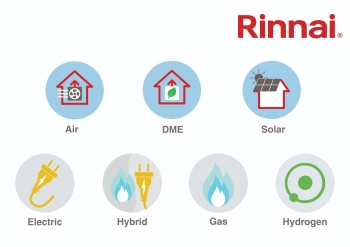Chris Goggin of Rinnai examines the UK's strategy for improving and expanding grid connections to newly built renewable energy facilities. He examines how attention might be drawn to the possible effects on customer alternatives in the UK and the future of the UK energy mix.
Visit www.rinnai-uk.co.uk/contact-us/newsletter-sign to subscribe to our newsletter now for more opinion pieces on UK energy mix and policy.
Realising that the current use of fossil fuels is unmaintainable from an environmental standpoint, every major nation is bidding to decarbonise all industrial and commercial processes. As a result, every major global economy is already formulating goals for future energy policies that will increase their unique domestic energy mixes.
Professionals in the field largely agree that to achieve the goal of lowering national carbon burdens, a variety of energy will need to be used. As part of the UK's ambition to decarbonise its home, commercial, and industrial operations, widespread electrification will play a key role in lowering carbon emissions both domestically and globally.
One of the key goals of UK policy makers is to electrify as many households as possible in the country by 2035 to give them the lowest power prices in the European Union. It is anticipated that the demand for electricity in the UK will double over the next ten years, reaching twice the current level of consumption by 2050.
Plans for the "Great Grid Upgrade" have been announced by the UK National Grid to meet future demand and supply for electricity. Because of the electrification that is moving the country away from fossil fuels, the national grid needs to be adjusted. The purpose of the existing UK grid was to move coal-fired electricity produced by strategically located power plants.
Nowadays, regions far from power plants provide a significant portion of the energy used in the United Kingdom. Offshore wind and solar energy is produced in rural and coastal areas, away from UK land. Building additional electrical grid connections is necessary to transport renewable energy around the UK and provide convenient distribution channels.
The estimated total cost of the improvement is £16 billion (Fund Calibre, Yardley, 2024) and will comprise grid links to offshore wind and rural solar systems, facilitating the seamless distribution of renewable energy across the entire country.
To help access renewable energy to the UK electrical system and reduce consumer prices, more electrical grid connections and upgrades are being pursued. Working together, the UK and Denmark have built a 475-mile link that connects southern Jutland and Lincolnshire.
With an investment of £1.7 billion, the Viking Link can power 2.5 million homes in the United Kingdom. According to National Grid, the new connection will allow for a clear trading route that balances seasonal demand and pricing between the two nations, saving UK customers £500 million in the first ten years.
The governments of the UK and the Netherlands have also declared their intentions to build an underwater link that will enable the exchange and transport of clean offshore wind-generated electricity between the two nations. By 2030, the Lion Link is expected to be operational, producing 1.8GW of energy, or enough to power 2.5 million homes. (Reference: National Grid website)
Over the next ten years, Scottish Power plans to improve its transmission network at a cost of £5.4 billion. The British system will receive 80–85GW of clean, renewable electricity because of these changes.
A lot of work is being done to connect and adapt the UK transmission network to provide affordable, clean electricity. Submarine links and domestic enhancements connecting the UK to two other nations should potentially offer UK homes and companies affordable supply of green power.
Manufacturers of decarbonising heating and hot water systems who have linked their product options with present and future UK energy mix policies should be the focus of contractors, specifiers, system designers, and installers.
To improve UK consumers' decision-making regarding decarbonising heating and hot water systems for their homes and businesses, Rinnai will keep offering realistic information that influences customer purchase alternatives. Rinnai keeps an eye on all local and international news pertaining to energy-related topics.
Utilise our smart carbon calculation services right now to benefit from Rinnai design services and discover the best solution for your upcoming project.
https://www.rinnai-uk.co.uk/contact-us/carbon-cost-comparison-form
